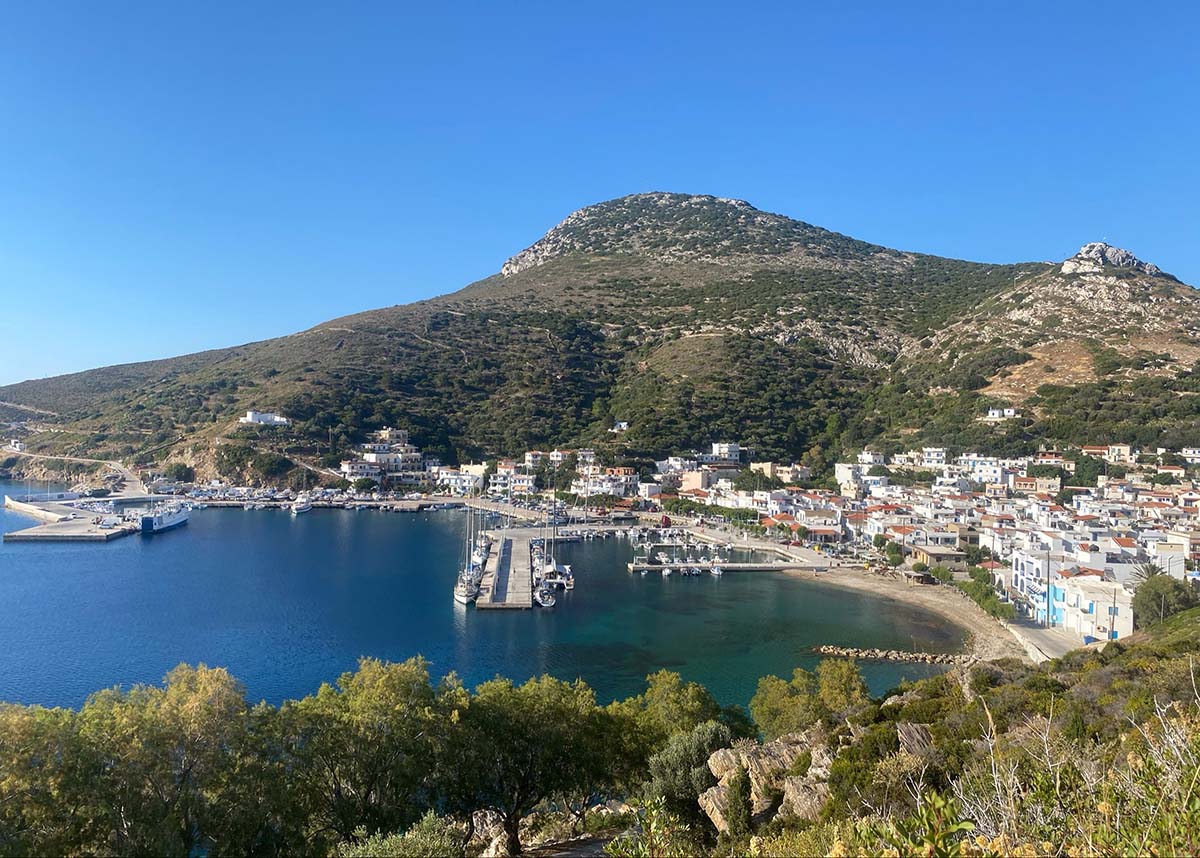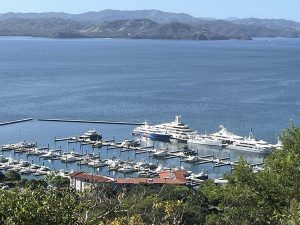
The Blue Zone
Published on April 28, 2025When someone familiar with the “On the Waterfront” column suggested The Blue Zone as a topic, I had no idea what the term referred to. My first thought was that the title suggested a piece about blue water boating, and you certainly could take it that way. But after a quick search, I discovered something fascinating. According to Google’s AI Overview, “Blue Zones” are regions where people consistently live longer, healthier lives. These areas are marked by a combination of lifestyle factors, diet and strong social connections. Intrigued, I dove deeper into the concept and learned that the term “Blue Zone” is a trademark, referring to five specific areas of the world where people more frequently live, and live well, past 80 years of age, with many reaching 100 or beyond.
So how does this relate to recreational boating and marinas? It turns out that four out of the five official Blue Zones are surrounded by water: the islands of Ikaria, Greece, and Sardinia, Italy, in the Mediterranean; and the island of Okinawa, Japan, and the Nicoya peninsula of Costa Rica, on opposite sides of the Pacific.
For years, I have said that being on or even just near the water has a certain magic about it. It feels mystical, soothing and has an undeniable impact on our quality of life. The calming sound of water, the breeze and the rhythm of a boat gently cutting through the waves all come together to create a sensory experience unlike any other. In one popular commercial, rainwater is used as a calming influence, as the natural world is often utilized to evoke a sense of peace. Similarly, numerous advertisements intentionally use water settings, whether it be a serene lake or the crashing waves of the ocean, to subliminally influence the consumer. Clearly, water plays a role in both relaxation and rejuvenation, but how does this fit into the larger picture of longevity, particularly in relation to the Blue Zones?
It turns out there are several key factors that contribute to longevity in Blue Zones. These include:
Physical Activity: Inhabitants of Blue Zones tend to engage in regular, low-impact physical activity as a part of their daily routine, versus structured exercise regimes. Physical activity might include things like walking, gardening or even swimming, all of which keep the body moving without the strain that often comes with more traditional exercise routines.

Purpose: A sense of purpose, known as “Ikigai” in Okinawa and “plan de vida” in Nicoya, is central to the lives of Blue Zone residents. This translates to having a reason to wake up in the morning, a reason to keep going. People who have a strong sense of purpose live longer because they stay motivated and connected to their community.
Social Connections: Longevity in Blue Zones is also closely linked to maintaining strong ties with family, friends and the community. People in these areas often live in environments that prioritize social interactions and a sense of belonging. Whether it’s gathering for meals, taking part in community events or simply spending time with loved ones, these social engagements promote a longer, healthier life.
Stress Management: People in Blue Zones have a natural ability to manage stress, which is one of the most important aspects of maintaining health. Techniques like meditation, spending time with family, engaging in hobbies or recreational activities all play a significant role in managing life’s pressures.
Recreational boating can certainly contribute to these factors, offering a form of low-impact physical activity, a chance to find purpose and an opportunity to connect with loved ones, friends and others sharing the same activity.
Low-Impact Physical Activity: Recreational boating is a great example of a low-impact activity that can be enjoyed by people of all ages. Whether it’s fishing, sailing or piloting a powerboat, being out on the water requires a certain amount of movement—such as steering the boat, casting the line or adjusting the sails—that engages the body in a mostly non-strenuous way. For those who want to make it more of a physical activity, watersports like waterskiing, wakeboarding, rowing or paddleboarding offer a chance to get the heart pumping and muscles moving.
Even simply cruising or fishing from a boat involves a level of physical engagement that benefits the body, without putting undue stress on joints or muscles, making it ideal for a long, healthy life.
Purpose and Connection: Boating can also provide a sense of purpose – one of the key elements for longevity in Blue Zones. Boating trips often involve long-term planning, whether it’s preparing for a day trip on a lake or an extended voyage across the seas. The act of setting out on the water to explore, relax or engage in a hobby like fishing gives people something to look forward to. In fact, many boaters create routines around their time on the water, and this regular engagement with the boating lifestyle can instill a deep sense of purpose.
More than that, boating fosters strong social connections. People often gather with friends and family to enjoy time on the water for a weekend getaway, a celebration or just an afternoon out. There’s a sense of camaraderie that comes with boating. It creates opportunities for bonding, with shared experiences of navigating waterways, making memories and sometimes overcoming challenges like unpredictable weather or equipment malfunctions. These shared moments can build lasting friendships and deepen relationships, contributing to a person’s sense of belonging and emotional well-being.
Stress Reduction: One of the most significant benefits of recreational boating is its ability to reduce stress. There’s something about being on the water – the fresh air, the sound of waves lapping against the boat and the rhythm of the journey – that naturally calms the mind and soothes the soul. Many people who engage in boating often talk about how it helps them disconnect from their daily worries and the stress of life on land.
Marinas can offer a sense of peace and tranquility. These hubs of activity, often set in beautiful natural locations by the water, can serve as sanctuaries for boaters, offering a space where they can simply relax and unwind.
The Role of Marinas
Marinas are much more than just parking lots for boats. As Neil Ross, cofounder of the International Marina Institute (now the Association of Marina Industries), once said, “Marinas are the conduit from the land into the water.” They are hubs for boating activity and serve as gathering points for the boating community. Marinas promote a lifestyle that extends beyond simply owning a boat. They are central to fostering connections, building relationships and facilitating the recreational boating experience.
These lifestyle-enhancing facilities are especially prominent in smaller, family-run marinas, where a more personal, community-oriented approach to boating is often taken. Some of the most successful and profitable marina chains also understand this and focus on providing more than just a place to dock. They create environments that encourage social interaction, leisure and the joy of being on the water. Whether it’s through regattas, tournaments, customer appreciation days, social events, boating classes or informal gatherings, marinas help to build a sense of community among boaters.
I believe this all helps explain why numerous types of boating are expanding. Specialty boats, such as those designed for wakeboarding and waterskiing, have been sold out in recent years, indicating a growing demand for fun, active boating experiences. Pontoon boating has also surged in popularity, offering a more laid-back social experience. Even personal watercraft like kayaks, canoes and paddleboards are rapidly growing in popularity, with more people embracing these accessible ways to enjoy the water. Chartering and cruising have also seen tremendous growth, with boating trips extending from short day outings to week-long adventures that span local, regional and even international waters.
When you consider the factors that contribute to longevity in Blue Zones – physical activity, purpose, social connection and stress management – it’s pretty clear that recreational boating aligns perfectly with these principles. Marinas, as central hubs for the boating lifestyle, provide the perfect environment to foster these key elements of well-being. Whether you’re taking a leisurely boat ride, engaging in a fun watersport or simply enjoying the marina environment, the water offers a magical way to enhance your quality of life and promote longevity.
Dan Natchez, CMP, is president of DANIEL S. NATCHEZ and ASSOCIATES Inc. He can be contacted by phone at 1/914/698-5678, by WhatsApp at 1/914/381-1234, by email at dan.n@dsnainc.com or online at www.dsnainc.com.
| Categories | |
| Tags |






